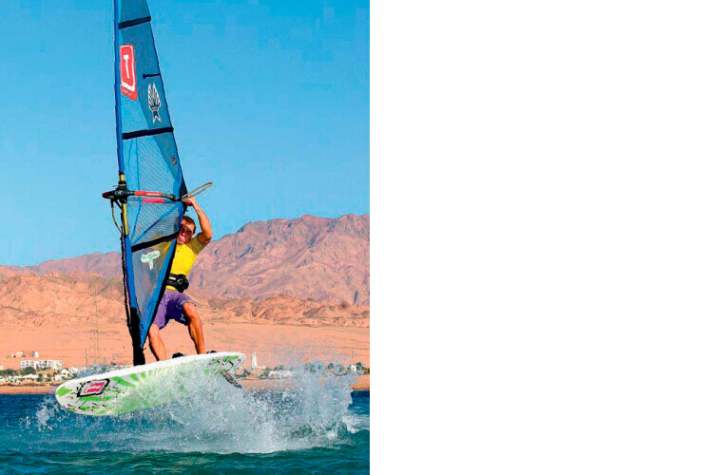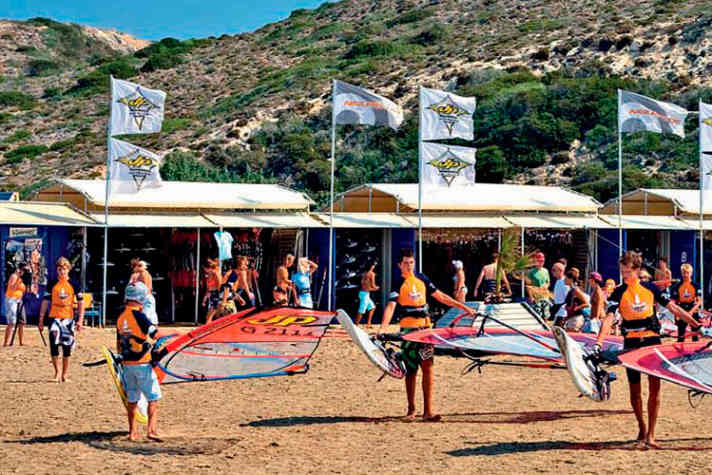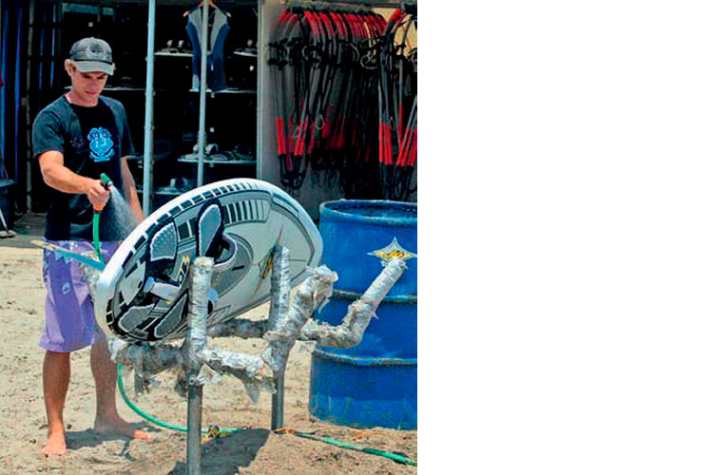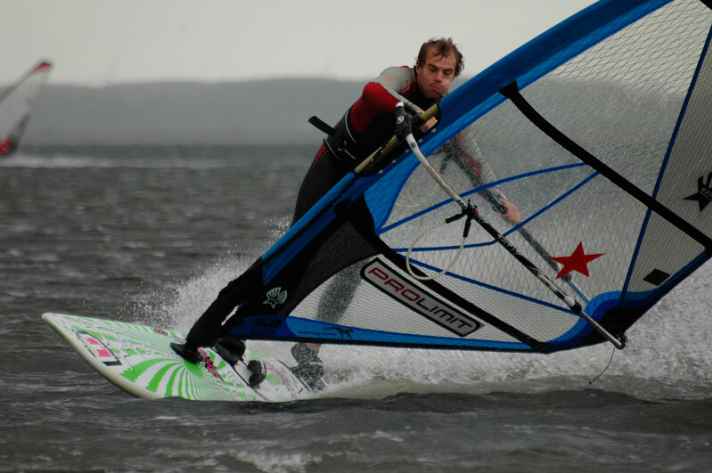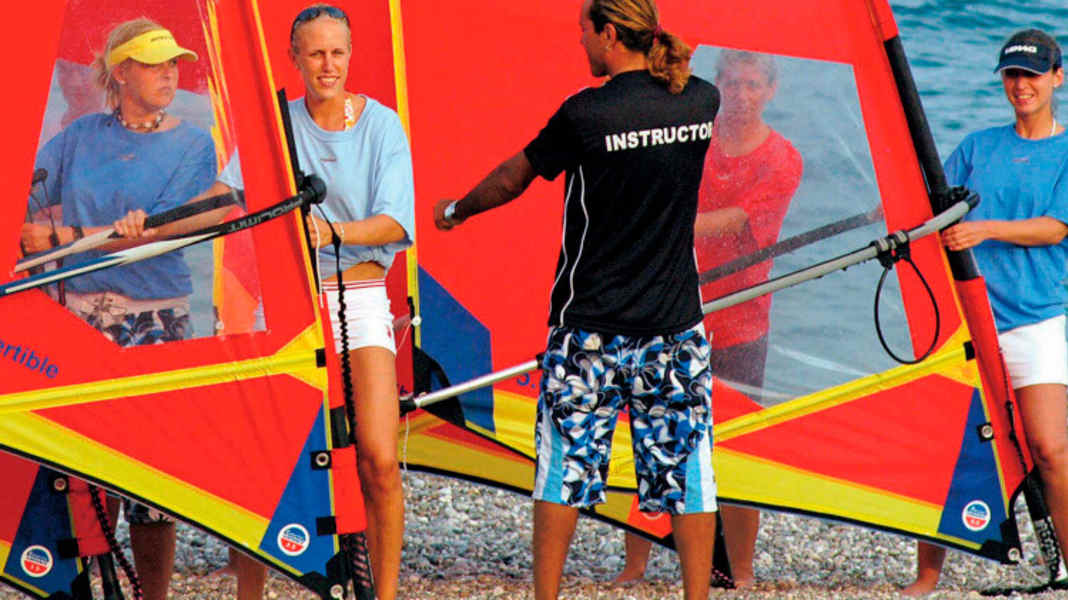
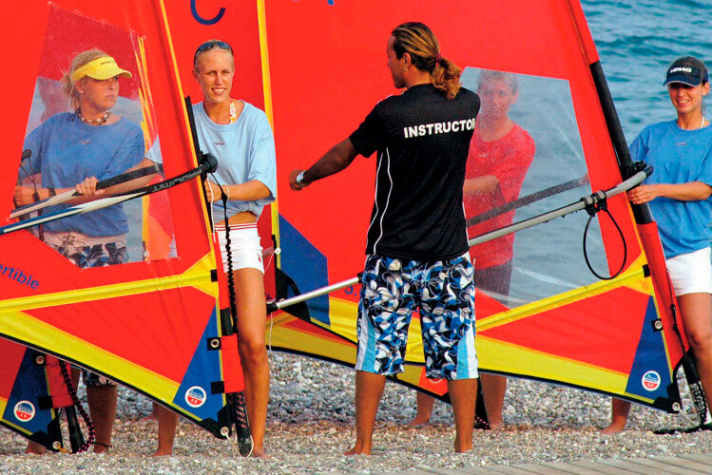
It's the middle of March. I'm sitting on the beach in Tarifa with my mate Martin, chatting about the upcoming summer holidays. There are plenty of destinations we want to travel to. We also have time. The university gives you a whole three months off in the summer. But as you already know from me, the money is not so loose. But I'm not the only one who feels that way. Anyone who studies and is a windsurfer usually has a money problem too.
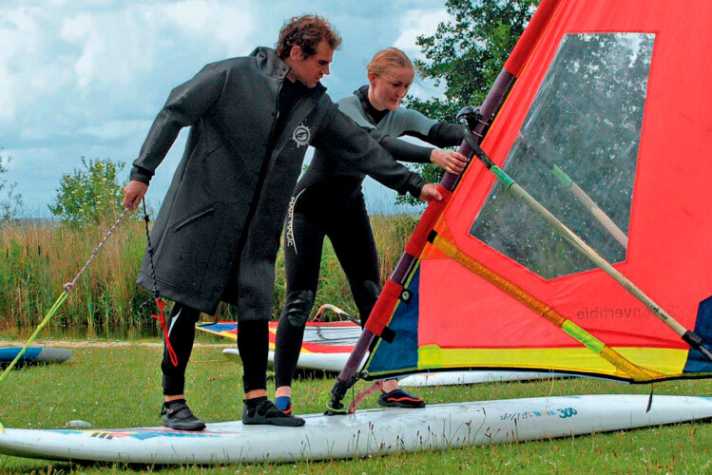
"Honest and upright work should lead me to money." Most of the destinations I have travelled to in my life as a surfer are linked to well-organised windsurfing and kitesurfing centres. Friends of mine have often told me about their summer jobs as surf instructors. However, this was mostly on the North Sea or Baltic Sea. However, I didn't want to imagine my semester break without any sun at all. I wanted to get a little tan. You have to bring something back from your holiday. The decision was made. I decided against the north and the numerous spots south of Münster, the city of my choice. I was already visualising it in my head: I would work as a surf instructor on my dream beach in the summer, meet hot girls, take a big step in my riding skills and start the next semester completely relaxed. But it wasn't quite that easy after all.
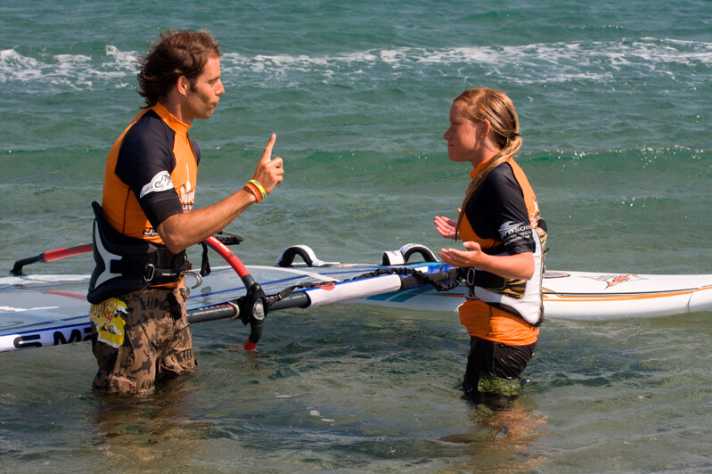
If, like me, you decide to work as a surf instructor, be it during school holidays, semester breaks or other free time, you can't avoid surf instructor training with the VDWS or VÖWS. This costs a few euros before you even earn a cent. However, you can easily earn back the costs of around 500 euros later on. Unemployed people who apply for VDWS surf instructor training to be paid for by the state receive a special subsidy. There is also a 50 per cent discount for students, so that even the poor students can save a few euros. So don't worry about the costs. The VDWS offers several dates each year when you can take the windsurfing instructor exam in a 7-day course. If you already have a licence, you have already cleared the first hurdle. If you want to save yourself the 500 euros, don't worry, surf centres also offer other jobs. SPOT CHOICE Now it's best to take a travel catalogue and browse through the most beautiful destinations. Depending on the time of year, there are spots with a higher or lower probability of wind. It's not helpful to get stuck on just one spot. Look for two or three spots that you would like to shortlist and apply to the station manager. APPLICATION As with a normal job, the application is the most important thing. You have to convince the centre management that you are the right person for the job. Depending on the size of the centre, there is a wide range of jobs to choose from. The classic job is surf instructor, but modern surf centres need a variety of other workers. Once you have decided on something, you need to find out the centre's email address on the internet and apply. A short CV is also part of your application. I was invited to an interview at Big Bay in Cape Town. After a joint session with my future boss, I got the job there. If, like me, you can't put on a show in front of the boss on the spot, you should briefly write something about your surfing skills in your application. But be honest, lies don't belong in an application and have short legs, especially when it comes to surfing skills. WHAT CAN YOU EXPECT? The journey is imminent and you start thinking about what to take with you. My experience has shown that if you have good windsurfing equipment, you shouldn't leave it to dry at home. So if, like me, you like to ride on your own equipment, you take it with you. However, you can usually use the equipment at the centre. However, it is advisable to clarify such matters with the centre before you arrive. However, a harness, harness ropes and a wetsuit that is suitable for the water temperature are essential. Most of these cannot be used from the centre. You can take personal items such as a notebook, CDs, DVDs, photos of your girlfriend and so on - but you don't have to. ACCOMMODATION The accommodation for employees varies depending on the centre. Some surf centres rent rooms for their employees and let them stay there free of charge, while other centres leave the choice of room and the associated costs up to you. Don't go straight for the offer with the highest earnings. If accommodation is not included in the price, you will quickly run out of money. Read your contract carefully and thoroughly. If you have any questions, ask them. You will also find the most important points in your contract - working hours and surfing times!!! ON SITE All that glitters is not gold. I quickly realised that. If you thought a job in a surf centre would be easy going, you're wrong. Working hours are usually six days a week - from 9am to 7pm. And all that in 35 degree temperatures with no shade. During the lunch break and the one-hour surf break, you also got to let off steam on the water. If there was still good wind after work, then we were back on the water. After the first week, I felt like I'd been working in construction for four weeks. Everything hurt. You humped for six days and then took a day off. The heat was unbearable at first. I worked for several hours in the sun, which kept my circulation constantly on the verge of collapse. When I did have time to surf, I often didn't feel like it. I just wanted to relax in the shade. This was not how I had imagined my dream job. But little by little, my body got used to everything. Tanned, with blonde hair and a burnt nose, I started the next few weeks. What was hard work for me at first quickly became routine and I was able to concentrate more and more on the essentials. TEACHING - LEARNING SITUATION Anyone who gives surfing lessons teaches their students how to surf. The amazing thing is that you can still learn a lot yourself. This applies not only to the handling of beginner equipment, but also in dealing with other people. I had a lot of fun riding back and forth next to my students on a beginner's board. You don't go fast, but you can look at the world around you in peace. It's a completely different surfing experience to the wave or freestyle boards I usually ride. I had long forgotten this feeling and am glad to have got to know it again. But what has helped me even more in my further development is dealing with the students. At first, I was quite impatient and upset when things didn't work out for my pupils. I didn't know how to give commands clearly and didn't know what it was like to have a whole group obey your every word over a longer period of time. Later on, it was just great fun to see how the students progressed. You learn to approach the whole thing with a portion of calm and can therefore enjoy the students' success. As a student teacher, it was particularly helpful for me to get my first impressions of the teacher-pupil role. SURFING People usually work in a surf centre because they are here to surf. The pay is rather poor, which is why it makes no sense to work in a surf centre for any other reason. The colleagues are generally nice and just as enthusiastic about windsurfing as you are. We were free to surf at different times. On the one hand, this is bad because you can't surf together with the friends you make there, but on the other hand it motivates you even more to go surfing yourself. When you see your mate working on new moves, you have to go out and try it yourself. The best days were when we went surfing with the whole team after work. At 7 pm, when the centre was closed, there was no one left on the water. Then we employees had the spot to ourselves. We could let off steam until the sun went down. Our boss was often on the water with us, and of course you're on a first-name basis with him at a surf centre. After the joint session, the highlights were rounded off with a beer in front of our flat. FRIENDS You get to know lots of nice people with whom you spend countless wonderful moments. At our centre, the Pro Center Christof Kirschner in Prasonisi on Rhodes, we were a colourful bunch. Men and women, kiters and windsurfers, from beginners to pros and from nine different countries. We communicated in English. And I know that whenever I have to go abroad, I'm guaranteed to have a friend there. DEPARTURE TO THE COLD HOMELAND As I sat on the plane on my way home, I reviewed my last two months. I had said goodbye and it wasn't easy for me as I had to leave a great time behind. I had spent two months with wonderful people, had a lot of fun working and surfing, learned new manoeuvres and made new friends. I now know two things for sure. You shouldn't give up straight away if something seems too difficult and I'll be back next year. You can find the entire article with all the information about the VDWS training programme as a PDF download below.
